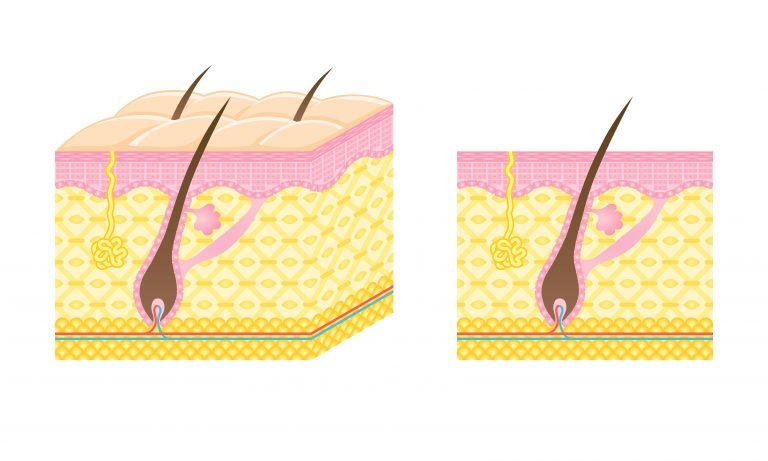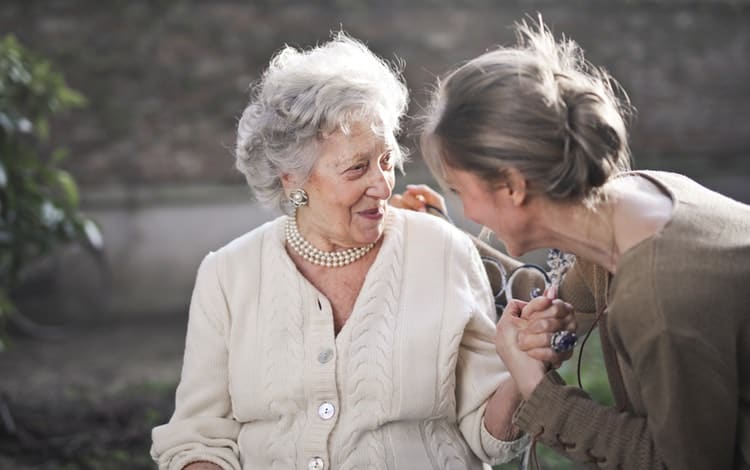
Page Contents
Most likely, you already know at least some of the basics behind how our hair grows and what makes it turn gray. However, if your hair is turning gray or something that worries you in the future, you may want to learn a bit more about the topic.
There is a lot of information on what causes gray hair and what can be done about it. Sometimes it can seem like there is too much information to sort through, while other areas seem vague.
Some Science On Gray
Your hair grows out of follicles that are all over your scalp. Different cells line the follicle’s sides; this leaves a hollow area in the center, which is the root of your hair. These cells make up the ‘shaft’ of the hair.
By itself, the shaft of your hair is colorless and would come out as white. However, close to the bottom of your hair follicles is another type of cell: melanocytes. This cell creates pigments, giving your hair its color.
These different cells in your follicle are always making new cells, which mold into the shaft. As more new cells are made, the older cells are pushed out of your scalp: hair growth!
The melanin makes multiple pigments. When combined, these pigments give your hair its unique color. Both the amount and type of pigment affects your hair color. As you age, the melanin cells begin producing less.
Eventually, your melanin cells die off or stop working. This also means that you have less pigmentation. When your hair begins growing both white and colored, that means your melanin cells are somewhat regulated.
During the cycles of your hair, there is a time when your follicle releases its shaft and rests. This resting cycle gives your follicle a much-needed break. However, this is the stage your melanin cells begin to give out, too.

The Genetics Of Gray Hair
Genetics is one of the most well-known causes of gray hair. While everyone’s hair will eventually turn gray, your genetics determines the speed of that aging process. As a general rule, you should look at your ethnicity.
Caucasians tend to gray the earliest, and Africans do not start graying until much later than other ethnicities.
Asians are closer to the African end of the gray hair spectrum, and the other ethnicities fall somewhere in between.
You may have heard the 50-50-50 rule of graying that states that 50 percent of people are 50 percent gray by 50 years old. However, this is usually true only for Caucasians. If you were to include other ethnicities into account, only about 10%-20% of the population would have 50% gray hair by the age of 50.
A Word On Red Hair
Did you know that your original hair color can play a part in when you gray? Red hair, in particular, grays the fastest no matter what your ethnicity is. This is because of the size of the molecules.
The molecules that make up red pigment are far larger than the molecules that make up other colors. Your hair follicles are the same size no matter what color your hair is; therefore, the follicles simply cannot store as much melanin for red hair as they can for the melanin of other hair colors.
Redheads simply run out of melanin faster. This is also why it is hard to dye your hair a natural red color. During the dying process, your natural pigment is taken out, and the new pigments are shoved into its place.
It is much harder to shove a larger molecule into a spot that was made for a smaller molecule for obvious reasons. Since the red molecules are larger, there are fewer of them needed to make something red. This is also why the color red fades so much faster than other colors.
When Graying Is A Problem

While graying is a natural thing, there are times when it is not due to natural causes. Although a handful of gray hairs show up when you are in your twenties, it is not until you are in your late thirties that they should start coming in by the dozen.
If you notice a lot of gray coming in before your late thirties, then something may be wrong. Some conditions can cause your hair to gray early, but you won’t know what’s wrong until you get tested.
If you fall into this category, you may be suffering from is a deficiency in vitamins; this can make you gray sooner and usually comes with other symptoms. Fortunately, these tests are easy to run and often come with easy solutions.
Did you know that certain medical conditions and prolonged illnesses can prevent you from absorbing vitamins properly?
Thyroid problems can cause premature graying, and, unfortunately, there is little that can be done. You should talk to your doctor if you suspect medical conditions are influencing your premature graying.
Some conditions affect your hair more directly. Certain funguses and bacteria can infect your scalp and can cause your hair to fall out. This can be in clumps or patches, or it can lead to an overall thinning of your hair, which will make you gray sooner if not dealt with.
A Word On Stress
Not only does stress pose significant health concerns, but it can take a considerable toll on your hair, too. For starters, stress can trigger a condition: Telogen effluvium.
This condition makes your hair fall out, sometimes in clumps in severe cases. When your hair grows back, you probably have lost some pigmentation. The sooner you can find a solution for your stress, the less damage will be done.
When your body produces melanin, it also makes a natural form of hydrogen peroxide. Most of the time, the peroxide is filtered out by your body or broken down by catalase cells.
However, if you are stressed, you may not be able to break the hydrogen peroxide down. When hydrogen peroxide builds up in your body, it can attach itself to your hair follicles; when this happens, you will naturally bleach your hair!
Before your hair even grows, the inside of the follicle will slowly be bleached. Not only will this make your hair gray while you still have melanin, but it can also kill your melanocyte cells that make your melanin.
Those are only two ways that stress can negatively impact your hair; there are many other things to watch out for. Most importantly, pressure decreases your overall health and causes many physical problems. It is better to get your stress under control before it escalates to these levels.
Reversing Gray Hair
There are all kinds of home remedies and over the counter products that claim to be able to reverse gray hair. Sometimes these seem to do wonders, while at other times, there seems to be no effect whatsoever; these products are dependent on the reason you are graying.
If you are graying due to genetics, then there is very little that you can do about it. However, if you are graying due to underlying health issues or other environmental influences, there is probably a solution.
For example, let’s look at vitamin deficiencies causing gray hair. Once you get enough of the vitamin or vitamins, your hair may very well grow out with its original color. Treating sicknesses that gray your hair can also help restore your natural tones.
In the case of stress, perhaps your hair is being bleached due to hydrogen peroxide. You would have to get rid of the stressor or go to the doctor to relieve those symptoms. You could also try to consume foods that are rich in catalase. Since catalase breaks down hydrogen peroxide, it will help eliminate any peroxide attached to your hair follicles.
Finally, certain herbs and plants fight to slow down the aging process. Although there is little research on this topic, herbs and plants are used in many cultures to postpone aging.

Preventing Gray Hair
Preventative measures will not change your genetics, but they can make sure that you do not gray any earlier than you absolutely have to. As a general rule of thumb, staying healthy and taking care of yourself is the best thing you can do for your hair.
Try to avoid bad habits like smoking and consuming avoid junk food/fast food; these things will speed up your aging and weakening your immune system.
Also, try to take daily vitamins; this will ensure that you have all the nutrition your hair needs to grow healthy and vibrant. Vitamins also improve your overall health, which helps prevent disease that could later turn your hair gray.
Final Thoughts
Although we know a great deal about gray hair, we still have to learn. For example, while we know that genetics play a large role in graying, we do not know which genes are responsible for this.
In the future, we probably will reach a closer conclusion on how to prevent gray hair entirely; However, this is not something that will happen overnight.
In the meantime, more and more people are choosing to gray gracefully. Fewer people are dyeing their gray hair and instead are showing it off! However, despite that, most people cannot get over the feeling that gray hair makes you look “old.”
This is not a new feeling, something even Buddha stated: “Gray hairs are like angels sent by the god of death.” Although aging will always be associated with gray hair, it’s never something to be sad about—everyone experiences it!







